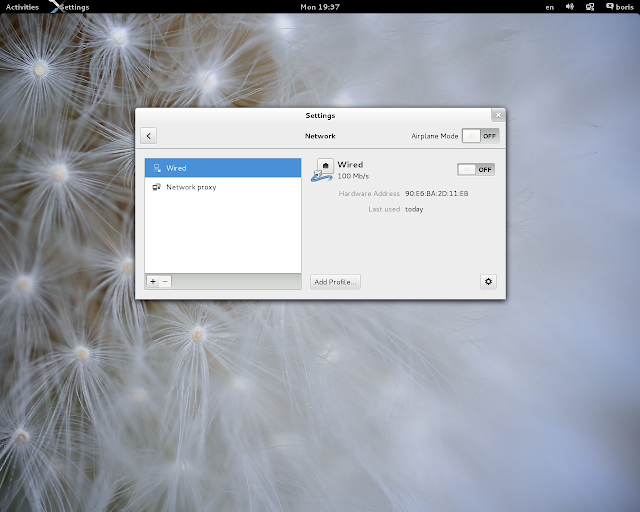Following http://www.gluster.org/category/openstack/
This is a snapshot to show the difference between the Havanna and Grizzly releases with GlusterFS.
| Grizzly | Havana |
|---|---|
| Glance – Could point to the filesystem images mounted with GlusterFS, but had to copy VM image to deploy it | Can now point to Cinder interface, removing the need to copy image |
| Cinder – Integrated with GlusterFS, but only with Fuse mounted volumes | Can now use libgfapi-QEMU integration for KVM hypervisors |
| Nova – No integration with GlusterFS | Can now use the libgfapi-QEMU integration |
| Swift – GlusterFS maintained a separate repository of changes to Swift proxy layer | Swift patches now merged upstream, providing a cleaner break between API and implementation |
Please, view also nice article: http://www.mirantis.com/blog/openstack-havana-glusterfs-and-what-improved-support-really-means/
Actually, on Glusterfs F19 Server included in cluster procedure of cinder tuning should be the same. First step - set up Havana RC1 RDO on Fedora 19 per
http://bderzhavets.blogspot.ru/2013/10/neutron-basic-rdo-setup-havana-to-have.html
Post install fix (as of 10/31/2013) :
Also set ALLOWED_HOSTS = ['*'] in /etc/openstack-dashboard/local_settings and restart httpdNext - installing GlusterFS Server on Cinder host
# yum install glusterfs glusterfs-server glusterfs-fuse
# systemctl status glusterd
glusterd.service - GlusterFS an clustered file-system server
Loaded: loaded (/usr/lib/systemd/system/glusterd.service; enabled)
Active: active (running) since Fri 2013-10-18 13:47:51 MSK; 2h 37min ago
Process: 1126 ExecStart=/usr/sbin/glusterd -p /run/glusterd.pid (code=exited, status=0/SUCCESS)
Main PID: 1136 (glusterd)
CGroup: name=systemd:/system/glusterd.service
├─1136 /usr/sbin/glusterd -p /run/glusterd.pid
├─8861 /usr/sbin/glusterfsd -s 192.168.1.135 --volfile-id cinder-volume.192.168.1.135.rhs-brick1-cinder-volume -...
├─8878 /usr/sbin/glusterfs -s localhost --volfile-id gluster/nfs -p /var/lib/glusterd/nfs/run/nfs.pid -l /var/lo...
└─8885 /sbin/rpc.statd
Oct 18 13:47:51 localhost.localdomain systemd[1]: Started GlusterFS an clustered file-system server.
Oct 18 13:58:19 localhost.localdomain rpc.statd[8885]: Version 1.2.7 starting
Oct 18 13:58:19 localhost.localdomain sm-notify[8886]: Version 1.2.7 starting
Oct 18 13:58:19 localhost.localdomain rpc.statd[8885]: Initializing NSM state
# mkdir -p /rhs/brick1/cinder-volume
# gluster volume create cinder-volume \
192.168.1.135:/rhs/brick1/cinder-volume
# gluster volume start cinder-volume
# gluster volume info
Volume Name: cinder-volume
Type: Distribute
Volume ID: d52c0ba1-d7b1-495d-8f14-07ff03e7db95
Status: Started
Number of Bricks: 1
Transport-type: tcp
Bricks:
Brick1: 192.168.1.135:/rhs/brick1/cinder-volume
A sample of utilizing stripe gluster volume may be viewed here
Configuring Cinder to Add GlusterFS
# openstack-config --set /etc/cinder/cinder.conf DEFAULT volume_driver cinder.volume.drivers.glusterfs.GlusterfsDriver
# openstack-config --set /etc/cinder/cinder.conf DEFAULT glusterfs_shares_config /etc/cinder/shares.conf
# openstack-config --set /etc/cinder/cinder.conf DEFAULT glusterfs_mount_point_base /var/lib/cinder/volumes
# vi /etc/cinder/shares.conf
192.168.1.135:cinder-volume
:wq
# iptables-save > iptables.dump
Add to *filter section:
-A INPUT -m state --state NEW -m tcp -p tcp --dport 111 -j ACCEPT
-A INPUT -m state --state NEW -m tcp -p tcp --dport 24007 -j ACCEPT
-A INPUT -m state --state NEW -m tcp -p tcp --dport 24008 -j ACCEPT
-A INPUT -m state --state NEW -m tcp -p tcp --dport 24009 -j ACCEPT
-A INPUT -m state --state NEW -m tcp -p tcp --dport 24010 -j ACCEPT
-A INPUT -m state --state NEW -m tcp -p tcp --dport 24011 -j ACCEPT
-A INPUT -m state --state NEW -m tcp -p tcp --dport 38465:38469 -j ACCEPT
# iptables-restore < iptables.dump
# service iptables restart
Restart openstack-cinder-volume service mounts glusterfs volume with no problems with ownership :
# service iptables restart
Restart openstack-cinder-volume service mounts glusterfs volume with no problems with ownership :
# for i in api scheduler volume ; do service openstack-cinder-${i} restart ;done
Redirecting to /bin/systemctl restart openstack-cinder-api.service
Redirecting to /bin/systemctl restart openstack-cinder-scheduler.service
Redirecting to /bin/systemctl restart openstack-cinder-volume.service
# df -h
Redirecting to /bin/systemctl restart openstack-cinder-scheduler.service
Redirecting to /bin/systemctl restart openstack-cinder-volume.service
# df -h
Filesystem Size Used Avail Use% Mounted on
/dev/mapper/fedora-root 164G 29G 127G 19% /
devtmpfs 3.9G 0 3.9G 0% /dev
tmpfs 3.9G 148K 3.9G 1% /dev/shm
tmpfs 3.9G 1.1M 3.9G 1% /run
tmpfs 3.9G 0 3.9G 0% /sys/fs/cgroup
tmpfs 3.9G 800K 3.9G 1% /tmp
/dev/sda1 477M 87M 362M 20% /boot
/dev/loop0 928M 1.4M 860M 1% /srv/node/device1
tmpfs 3.9G 1.1M 3.9G 1% /run/netns
192.168.1.135:cinder-volume 164G 29G 127G 19% /var/lib/cinder/volumes/f39d1b2d7e2a2e48af66eceba039b139
/dev/mapper/fedora-root 164G 29G 127G 19% /
devtmpfs 3.9G 0 3.9G 0% /dev
tmpfs 3.9G 148K 3.9G 1% /dev/shm
tmpfs 3.9G 1.1M 3.9G 1% /run
tmpfs 3.9G 0 3.9G 0% /sys/fs/cgroup
tmpfs 3.9G 800K 3.9G 1% /tmp
/dev/sda1 477M 87M 362M 20% /boot
/dev/loop0 928M 1.4M 860M 1% /srv/node/device1
tmpfs 3.9G 1.1M 3.9G 1% /run/netns
192.168.1.135:cinder-volume 164G 29G 127G 19% /var/lib/cinder/volumes/f39d1b2d7e2a2e48af66eceba039b139
# nova image-list
+--------------------------------------+------------------+--------+--------+
| ID | Name | Status | Server |
+--------------------------------------+------------------+--------+--------+
| 59758edc-da8d-444e-b0a0-d93d323fc026 | F19Image | ACTIVE | |
| df912358-b227-43a5-94a3-edc874c577bc | UbuntuSalamander | ACTIVE | |
| ae07d1ba-41de-44e9-877a-455f8956d86f | cirros | ACTIVE | |
+--------------------------------------+------------------+--------+--------+
Creating volume via command line :
# cinder create --image-id 59758edc-da8d-444e-b0a0-d93d323fc026 --display_name Fedora19VL 5
# cinder list
+--------------------------------------+--------+--------------+------+-------------+----------+
| ID | Status | Display Name | Size | Volume Type | Bootable | Attached to |
+--------------------------------------+--------+--------------+------+-------------+----------+
| 0474ead2-61a8-41dd-8f8d-ef3000266403 | in-use | | 5 | None | true | 779b306b-3cb2-48ea-9711-2c42c508b577 |
| da344703-dcf9-450e-9e34-cafb331f80f6 | in-use | Fedora19VL | 5 | None | true | 1a8e5fa5-6a79-43f0-84ee-58e2099b1ebe |
+--------------------------------------+--------+--------------+------+-------------+----------+

References
http://www.gluster.org/community/documentation/index.php/GlusterFS_Cinder
+--------------------------------------+------------------+--------+--------+
| ID | Name | Status | Server |
+--------------------------------------+------------------+--------+--------+
| 59758edc-da8d-444e-b0a0-d93d323fc026 | F19Image | ACTIVE | |
| df912358-b227-43a5-94a3-edc874c577bc | UbuntuSalamander | ACTIVE | |
| ae07d1ba-41de-44e9-877a-455f8956d86f | cirros | ACTIVE | |
+--------------------------------------+------------------+--------+--------+
Creating volume via command line :
# cinder create --image-id 59758edc-da8d-444e-b0a0-d93d323fc026 --display_name Fedora19VL 5
# cinder list
+--------------------------------------+--------+--------------+------+-------------+----------+
| ID | Status | Display Name | Size | Volume Type | Bootable | Attached to |
+--------------------------------------+--------+--------------+------+-------------+----------+
| 0474ead2-61a8-41dd-8f8d-ef3000266403 | in-use | | 5 | None | true | 779b306b-3cb2-48ea-9711-2c42c508b577 |
| da344703-dcf9-450e-9e34-cafb331f80f6 | in-use | Fedora19VL | 5 | None | true | 1a8e5fa5-6a79-43f0-84ee-58e2099b1ebe |
+--------------------------------------+--------+--------------+------+-------------+----------+
# ls -l /var/lib/cinder/volumes/f39d1b2d7e2a2e48af66eceba039b139
total 5528248
-rw-rw-rw-. 1 qemu qemu 5368709120 Oct 18 16:19 volume-0474ead2-61a8-41dd-8f8d-ef3000266403
-rw-rw-rw-. 1 qemu qemu 5368709120 Oct 18 16:19 volume-da344703-dcf9-450e-9e34-cafb331f80f6
Screen shots on another F19 instance dual booting with first
Creating via cinder command line Ubuntu 13.10 Server bootable volume in glusterfs storage :

References
http://www.gluster.org/community/documentation/index.php/GlusterFS_Cinder






































